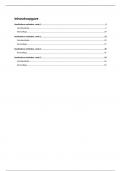College aantekeningen
Alle college aantekeningen + bijbehorende literatuur, Kwalitatieve methoden
- Instelling
- Universiteit Leiden (UL)
Alle college aantekeningen en de bijbehorende literatuur van het vak "Kwalitatieve methoden" van iemand die bij alle hoorcolleges aanwezig was en het vak in één keer gehaald heeft
[Meer zien]




